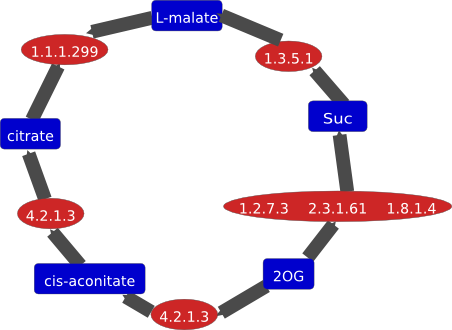EC Number   |
General Information   |
Reference   |
|---|
    2.7.2.3 2.7.2.3 | evolution |
the PGKB transcript is approximately three-fold more abundant than the PGKC transcript in promastigotes |
-, 738183 |
    2.7.2.3 2.7.2.3 | malfunction |
an enzyme-deficient mutant can grow in medium with glucose, galactose, fructose, mannose or sucrose, as the sole carbon source, cannot utilize pyruvate, and shows a reduction of extracellular polysaccharide biosynthesis, cell motility, and intracellular ATP. As a result, the virulence of the enzyme-deficient mutant is significantly compromised in host soybean |
-, 761149 |
    2.7.2.3 2.7.2.3 | malfunction |
mutations in hPGK1 cause human PGK1 deficiency, a rate metabolic conformational disease. Most of these mutations cause protein kinetic destabilization by significant changes in the structure/energetics of the transition state for irreversible denaturation. Protein kinetic destabilization by acidic pH is strongly linked to lower thermodynamic stability, while in disease-causing mutations seems to be linked to lower unfolding cooperativity. The plasticity of the hPGK1 denaturation mechanism responds differently to changes in pH and in disease-causing mutations |
737784 |
    2.7.2.3 2.7.2.3 | malfunction |
perturbation of enzyme form PGK1 in cancer cells insignificantly affects the conversion of glucose to lactate in glycolysis. Enzyme knockdown does not significantly affect the glycolysis rate, moderately reduces serine consumption and de novo serine synthesis |
761524 |
    2.7.2.3 2.7.2.3 | malfunction |
plants with single mutations in the plastidial enzyme gene pgkp1 are not significantly affected, whereas a pgkp1pgkp2 double mutation is lethal due to retarded carbon fixation. Mutants are albino due to a plastid-oriented galactoglycerolipid deficiency |
762148 |
    2.7.2.3 2.7.2.3 | malfunction |
plants with single mutations in the plastidial enzyme gene pgkp2 are not significantly affected, whereas a pgkp1pgkp2 double mutation is lethal due to retarded carbon fixation. Mutants are albino due to a plastid-oriented galactoglycerolipid deficiency |
762148 |
    2.7.2.3 2.7.2.3 | malfunction |
reduction of PGK decreases the accumulation of Bamboo mosaic virus BaMV coat protein |
739347 |
    2.7.2.3 2.7.2.3 | malfunction |
targeted disruption of Pgk2 by homologous recombination eliminates PGK activity in sperm and testis, and severely impairs male fertility, but does not block spermatogenesis. Mating behavior, reproductive organ weights (testis, excurrent ducts, and seminal vesicles), testis histology, sperm counts, and sperm ultrastructure are indistinguishable between Pgk2(-/-) and wild-type mice. Sperm motility and ATP levels are markedly reduced in males lacking PGK2. Pgk2(-/-) males sire occasional pups. Alternative pathways that bypass the PGK step of glycolysis exist. One of these bypass enzymes, acylphosphatase, is active in mouse sperm, perhaps contributing to phenotypic differences between mice lacking GAPDHS or PGK2 |
702527 |
    2.7.2.3 2.7.2.3 | metabolism |
anaerobic fermentative metabolism of glycerol. Proteome analysis as well as enzyme assays performed in cell-free extracts demonstrate that glycerol is degraded via glyceraldehyde-3-phosphate, which is further metabolized through the lower part of glycolysis leading to formation of mainly ethanol and hydrogen |
748573 |
    2.7.2.3 2.7.2.3 | metabolism |
cytosolic isoform Pgk3 is involved in glycolysis (ATP production) while isoforms Pgk1 and Pgk2 are specific for plastid photosynthesis (ATP consumption) |
762191 |





